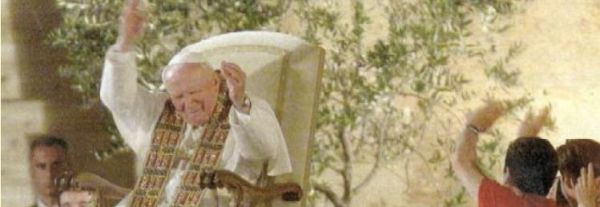Faith in Christ Is Directed to Man's Freedom
7. The urgency of missionary activity derives from the radical newness of life brought by Christ and lived by his followers. This new life is a gift from God, and people are asked to accept and develop it, if they wish to realize the fullness of their vocation in conformity to Christ. The whole New Testament is a hymn to the new life of those who believe in Christ and live in his Church. Salvation in Christ, as witnessed to and proclaimed by the Church, is God's self-communication: "It is love which not only creates the good, but also grants participation in the very life of God: Father, Son and Holy Spirit. For he who loves desires to give himself."
God offers mankind this newness of life. "Can one reject Christ and everything that he has brought about in the history of mankind? Of course one can. Man is free. He can say 'no' to God. He can say 'no' to Christ. But the fundamental question remains: Is it legitimate to do this? And what would make it legitimate?"
8. In the modern world there is a tendency to reduce man to his horizontal dimension alone. But without an openness to the Absolute, what does man become? The answer to this question is found in the experience of every individual, but it is also written in the history of humanity with the blood shed in the name of ideologies or by political regimes which have sought to build a "new humanity" without God.
Moreover, the Second Vatican Council replies to those concerned with safeguarding freedom of conscience: "The human person has a right to religious freedom.... All should have such immunity from coercion by individuals, or by groups, or by any human power, that no one should be forced to act against his conscience in religious matters, nor prevented from acting according to his conscience, whether in private or in public, whether alone or in association with others, within due limits."
Proclaiming Christ and bearing witness to him, when done in a way that respects consciences, does not violate freedom. Faith demands a free adherence on the part of man, but at the same time faith must also be offered to him, because the "multitudes have the right to know the riches of the mystery of Christ-riches in which we believe that the whole of humanity can find, in unsuspected fullness, everything that it is gropingly searching for concerning God, man and his destiny, life and death, and truth.... This is why the Church keeps her missionary spirit alive, and even wishes to intensify it in the moment of history in which we are living." But it must also be stated, again with the Council, that "in accordance with their dignity as persons, equipped with reason and free will and endowed with personal responsibility, all are impelled by their own nature and are bound by a moral obligation to seek truth, above all religious truth. They are further bound to hold to the truth once it is known, and to regulate their whole lives by its demands".
[Pope John Paul II, Redemptoris Missio]












